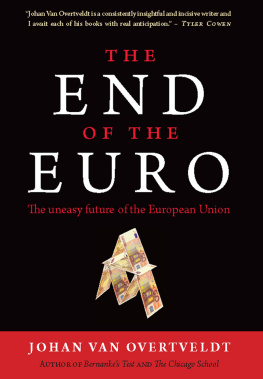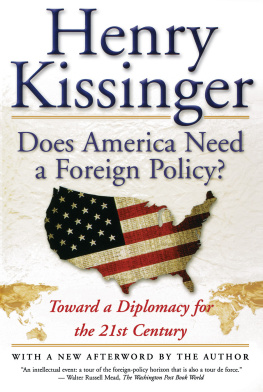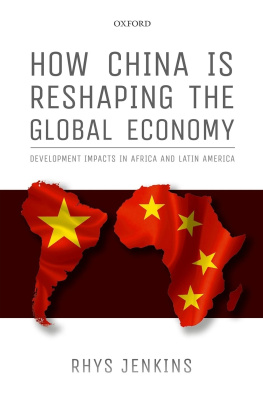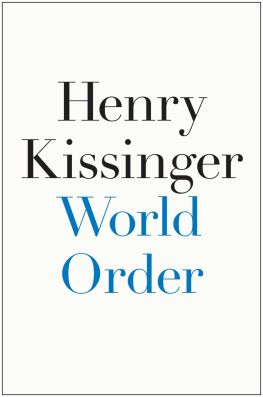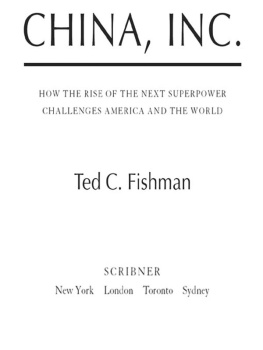
ALSO BY JOHAN VAN OVERTVELDT
The Chicago School
Bernankes Test
The End of the Euro

Copyright 2015 Johan Van Overtveldt.
All rights reserved. No part of this book may be reproduced or transmitted in any form or by any means, electronic or mechanical, including photocopying, recording, or by any information storage and retrieval system, without express written permission from the publisher.
Library of Congress Cataloging-in-Publication Data
Overtveldt, Johan van.
A giant reborn : why the US will dominate the 21st century / Johan Van Overtveldt.
pages cm
Summary: An analysis of global economic affairs, making the case that the United States will continue to be the worlds sole superpower in the 21st century--Provided by publisher-- Provided by publisher.
Includes bibliographical references and index.
ISBN 978-1-572847-50-7
1. United States--Economic policy--21st century. 2. United States--Politics and government--21st century. 3. United States--Foreign relations--21st century. I. Title.
HC106.84.O94 2015
327.7300112--dc23
2015013356
10 9 8 7 6 5 4 3 2 1 15 14 13 12 11
B2 Books is an imprint of Agate Publishing.
Agate books are available in bulk at discount prices. For more information, go to agatepublishing.com.
Dedicated to the memory of Milton Friedman and Gary Becker.
Superb scholars, generous men.
Contents
W AGS HAVE LONG CREDITED OTTO VON BISMARCK (18181898), the legendary Prussian aristocrat and statesman known as the founding father of modern Germany, with saying that a special Providence protects children, drunkards and the United States of America. Perhaps in his day, that was true, but lately, that Providence that Bismarck supposedly referenced seems to have finally given up on the United States. In high-level discussions since the late 2000s, the United States is generally cast not as a dominant force in world affairs, but instead as being in unstoppable decline. Chestnuts like America, the hyper-power or the one-dimensional American world order are no longer commonly heard. The American Century, it seems, is over, and its time for something new.
Details of the story, as well as how fast the fall from glory will be, vary from one messenger to the next, but the conclusion is the same: America is in decline. An empire enthralled with its own power and unaware that it is fading, so the New York Times described the United States in 2007.its place at the top. Alfred McCoy, a professor of history at the University of WisconsinMadison, declared in 2010 that
the demise of the United States as the global superpower could come far more quickly than anyone imagines. If Washington is dreaming of 2040 or 2050 as the end of the American Century, a more realistic assessment of domestic and global trends suggests that in 2025, just 15 years from now, it could all be over except for the shouting.
Early in 2014 Peter Beinart, a professor at City University of New York and former editor of The New Republic, wrote an article entitled The End of American Exceptionalism. Michael Snyder of The American Dream blog echoed the same theme:
The reality is that the United States is in a deep state of decline, and it is getting harder to deny that fact with each passing day. Mentally, emotionally, physically, spiritually and financially we are a train wreck. We have abandoned the values and the principles that early Americans held so dear, and as a result our society is a giant mess.
Snyder goes on to list 55 items illustrating his argument for Americas deep state of decline.
Empires and superpowers come and go with regularity. The United States has followed in the footsteps of the British Empire, the hegemonic world power from the end of the Napoleonic Wars in 1815 to the start of World War I in 1914. Its safe to say that
global history from 1500 to 1945 is a lengthy treatise of increasing contact and conflict among a series of great regional powers. Some of these powers achieved supra-regional empires, with the Spanish, French and English being the most obvious. Several regional powers
Its worth mentioning that none of these historic powers achieved the degree of dominance attained by the United States in the years immediately following World War II. Not even Great Britain came close.
Great Britains dominance was largely due to its primacy in the first Industrial Revolution and its naval forces. Notably, its demise was swift. In the words of legendary international investor Jim Rogers: After overseeing an empire on which the sun never set, the country descended into economic chaos within a single generation and was bankrupt within three. During the interwar period, the United States took over as the leading nation in the world, but the Roaring Twenties were quickly followed by the Great Depression, which hit the United States harder than practically any other country in the world. In the wake of World War II, however, the United States rose again to world prominence.
In 1941, Time and Life publisher Henry Luce first advanced the concept of the twentieth century as
the first great American Century [with] America as the dynamic center ever-widening spheres of enterprise, America as the training center of the skillful servants of mankind, America as the Good Samaritan, really believing again that it is more blessed to give than to receive, and America as powerhouse of the ideals of Freedom and Justice.
When the communist Soviet Union, Americas only real challenger during that period, collapsed at the end of the 1980s, the world seemed to have become unipolar. The United States had won the Cold War. According to some analysts, the end of history had arrived: Liberal democracy, as embodied in the ideology and values defended by the United States, was well on its way to conquering the world.
Almost a quarter century later, not much remains of the victorious mood that followed the end of the Cold War. Even worse, so the declinist dogma goes, a rapid decline of the United States as a superpower is now unavoidable. If the American Century began in 1945, then, the Century will be considerably less than 100 years. American declinism theory basically consists of two tracks: one internal, the other external.
Internal factors bringing about Americas supposed decline are related to successive, accumulating policy failures. Global economist David Malpass stated: Though a great nation, we are making such deep policy mistakes that we are in decline.
Declinists believe that this internal degradation is not reserved for the political, economic, and military spheres; they find it is even more pervasive in the cultural and personal spheres. W. James Antle III, associate editor of The American Spectator, has groused that Americas
culture is awash in the raw sewage of vulgarity and avarice. The family is shattered. The average American cannot articulate why marriage is not a unisex institution. One baby out of three is born out of wedlock. Another million per year are snuffed out in the womb. We are bound by no common faith or culture. Mass immigration, much of it illegal, without accompanying assimilation may deprive us of a common language.
Next page

